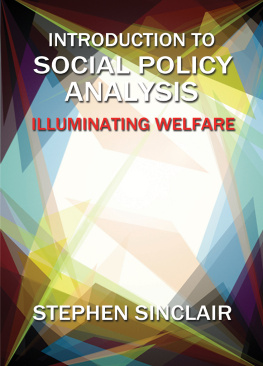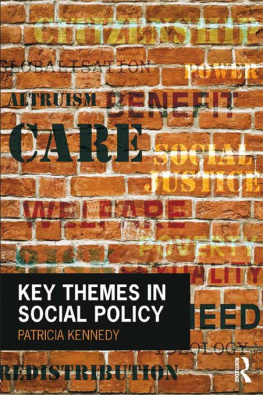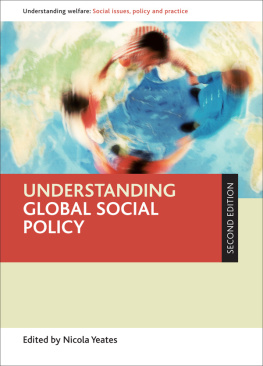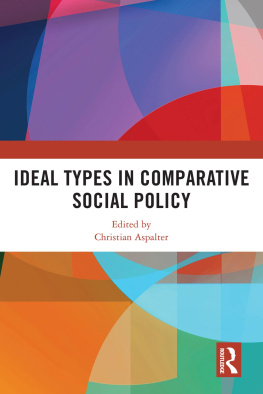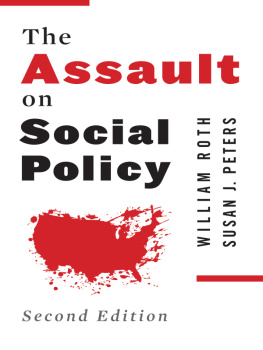INTRODUCTION TO SOCIAL POLICY ANALYSIS
Illuminating welfare
Stephen Sinclair
First published in Great Britain in 2016 by
Policy Press University of Bristol 1-9 Old Park Hill Bristol BS2 8BB UK Tel +44 (0)117 954 5940 e-mail pp-info@bristol.ac.uk www.policypress.co.uk
North American office: Policy Press c/o The University of Chicago Press 1427 East 60th Street Chicago, IL 60637, USA t: +1 773 702 7700 f: +1 773-702-9756 e:
Policy Press 2016
British Library Cataloguing in Publication Data
A catalogue record for this book is available from the British Library.
Library of Congress Cataloging-in-Publication Data
A catalog record for this book has been requested.
ISBN 978-1-4473-1392-2 paperback
ISBN 978-1-4473-1391-5 hardcover
ISBN 978-1-4473-1393-9 ePub
ISBN 978-1-4473-1394-6 Mobi
The right of Stephen Sinclair to be identified as author of this work has been asserted by him in accordance with the 1988 Copyright, Designs and Patents Act.
All rights reserved: no part of this publication may be reproduced, stored in a retrieval system, or transmitted in any form or by any means, electronic, mechanical, photocopying, recording, or otherwise without the prior permission of Policy Press.
The statements and opinions contained within this publication are solely those of the author and not of The University of Bristol or Policy Press. The University of Bristol and Policy Press disclaim responsibility for any injury to persons or property resulting from any material published in this publication.
Policy Press works to counter discrimination on grounds of gender, race, disability, age and sexuality.
Cover design by Tony Sinclair
Front cover: image kindly supplied by Stephen Sinclair
Readers Guide
This book has been optimised for PDA.
Tables may have been presented to accommodate this devices limitations.
Image presentation is limited by this devices limitations.
Dedicated to my brothers and sisters and to the memory of our parents.
Contents
I would like to express my gratitude to the late Chelly Halsey for enabling me to continue my postgraduate studies in Social Policy, to Peter Taylor-Gooby for years of support and to Stephen Moore for giving me my first job teaching Social Policy and being such a generous colleague. I would particularly like to thank Adrian Sinfield for the encouragement he has provided over a long time and his many helpful comments and advice on this book. I am grateful to Tony Sinclair for designing the cover, and Policy Press editors Laura Vickers and Emily Watt for their patience. I hope they all find something here that made it worth the wait.
Analysing social policies: key points
Social Policy analyses social challenges and collective measures to enhance well-being.
Social Policy considers both scientific and moral questions.
Social Policy analysis extends beyond what is usually thought of as the welfare state.
There are four dimensions to Social Policy analysis: empirical, distributional, ethical and critical.
Theories and concepts are indispensable to Social Policy analysis. The qualities of a useful theory are consistency, comprehensiveness, parsimony, fruitfulness and elegance.
The most illuminating theories and concepts in Social Policy clarify the causes of and inform response to the most damaging conditions confronting societies.
Understanding Social Policy
My aim in this book is to introduce readers to Social Policy analysis and to help them think coherently about social problems and how societies collectively respond to them. It is not intended to be a systematic introduction to social policies or to the welfare state in general. There are already many such books and readers can turn to them to learn more about the details of policies. Instead, the purpose is to introduce the distinctive nature of Social Policy analysis and some of the insights provided by this way of looking at social issues. I hope to show readers how to think like a Social Policy analyst by illustrating how a selection of ideas provides insights into some of the basic questions raised by social welfare. Thinking about such issues requires analysis, that is, unravelling the relationships between the different components of complex issues, examining how social systems function, unpicking arguments and interrogating the evidence used to justify social policies. Studying Social Policy also requires synthesis: recognising connections between different concepts and factors, such as how poverty relates to inequality, or the relationship between social exclusion and citizenship.
Each chapter considers an important question about social well-being and introduces what, in my experience, have been some of the most illuminating ideas applied to understand and answer them. My aim is to describe and demonstrate the value of these concepts: how they contribute to understanding the social world, help summarise the key features of important developments or make sense of large amounts of information, and how they cast new light on social issues and challenge ill-considered assumptions. These concepts, theories and ways of thinking provide powerful insights into some of the perennial and pressing issues facing society.
Social Policy is concerned with addressing serious social problems and it can be earnest and even upsetting at times. Most Social Policy analysts are motivated by concern for those experiencing problems and a desire to improve the world, so we do not often express how stimulating it is to analyse these issues as this might appear frivolous, or even exploitative. However, studying Social Policy is not just about struggling with unappealing technical issues and troubling social problems. The intellectual excitement when a theory or insight makes sense of what appears to be a mass of complex detail and reveals the social forces and factors that explain it is a deeply rewarding experience.
The questions and concepts outlined in this book are not intended to be exhaustive or definitive; they are a starting point to illustrate what is involved in Social Policy analysis and to show the insights that it can provide. While I hope to show readers how to think about Social Policy issues, it is not my aim to tell anyone what to think, although, for reasons outlined later, I do not believe that social problems and policies can be analysed with complete neutrality. The insights that I think are provided by the ideas selected and applied here do not amount to an overall perspective. There are also many other books that offer those, and I hope that the ideas and analyses provided in this book will help readers to assess them.
Social Policy involves continuous debate rather than settling on a dogma of fixed ideas. This characteristic will not appeal to everyone, but for those willing to accept the challenge of questioning received opinion, including their own, then Social Policy analysis provides an invigorating freshness. The evidence, arguments and insights produced by the best Social Policy analyses can transform our understanding of the world and change ourselves and society in the process. This is why Social Policy is worth studying.
What is Social Policy?
Much of what governments do could be described as social policy. For example, providing social security benefits, funding or delivering health and education services, regulating industry and employment, and providing cultural and leisure services are all examples of actions that governments take to promote social welfare. Many private companies are also heavily involved in delivering social policies education, health, transport and even prisons in some countries are provided as commercial services, sometimes through complex partnerships with government or voluntary and community organisations. Even more welfare is provided by families and within households, although these might not usually be thought of as matters of policy at all. This last point is itself an important issue. What should count as a social or welfare policy is discussed in .

